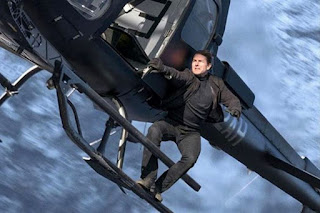Loving "Bohemian Rhapsody"
At times "Bohemian Rhapsody" threatened to collapse under the weight of some much-repeated ideas, such as Queen as not just a band but a family, and Freddie Mercury's wanting love and respect for his offstage, oft-hidden, real self. Some audience members may have been on edge during a key late scene which, like too many movies, found heavy rain pouring down on our main, mournful character.
While Mercury died in 1991, "Bohemian Rhapsody" uses Live Aid as the conclusion of its story. After all, we know what awaits him. It begins with Mercury's meeting guitarist Brian May (played by Gwilym Lee) and drummer Roger Taylor (Ben Hardy) who, along with bass player John Deacon (Joseph Mazzello) became Queen. May and Taylor have been scratching out low-end gigs while Mercury has a dead-end job, a low-key personality and some unrealized dreams as a songwriter and a singer.
Once Mercury takes the stage, he reveals a charismatic, audience-grabbing, costume-adorning side that not only propels the band to stardom, it creates a partnership that for some time benefits all concerned, as musicians and as writers. The movie takes pains to show that, as much as Mercury could be brilliant, the others also contributed to the songwriting and production -- that May, for one, comes up with "We Will Rock You," and Deacon is the man behind "Another One Bites the Dust." Mercury, in addition, finds that his attempt at working without his bandmates -- without, yes, the only real family he has -- is a disaster.
May and Taylor's producer credits and oversight of the music for the film may have helped push the film to show Queen as highly collaborative. (Deacon is retired and reportedly little seen in public.) But a quick check of the writing credits on Queen's greatest-hits albums underscores how May, Deacon, Taylor and Mercury all made major contributions. And the movie itself has the most fun when the band is relatively new, trading ideas in the studio, especially in the long section about the making of "Rhapsody," where the guys will try just about anything in pursuit of a different sound -- something as much a misfit in its pop era as the band, and the people they reached out to, felt.*
After all, even as the movie is about making of memorable music, Anthony McCarten's screenplay (from a story by McCarten and Peter Morgan) also addresses Mercury's sense of being a misfit, touched on very quickly as he admires an item in a clothing store only to be told that it's garb for women, then carried through his romance with Mary Austin (Lucy Boynton); his facing up to being gay, and the contrast between the fearless onstage idol and the frightened, lonely, easily manipulated private man.
It is in that contrast that Malek is especially good, making Mercury's profession of love to Mary at once endearing and terribly awkward, and sad. His much-later confession to the band that he has AIDS is all the more striking because, at last, Mercury is direct and open -- and therefore able to open up to audiences more powerfully than he ever did before.
"Bohemian Rhapsody" was in the works for almost a decade, and involved changes in the announced casting as well as a late-in-production shift in directing from Bryan Singer (the credited director) to Dexter Fletcher. With Malek in no position to match Mercury's vocals, the sound in the film comes from the use of parts of Mercury tracks along with singing by Marc Martel, well known for replicating Mercury.
Still, the final product meets the challenges. To be sure, the story of almost any band is going to have similarities. Thinking back over "Bohemian Rhapsody," I kept being reminded of aspects of "Jersey Boys," for one. At the same time, this has Malek's extraordinary acting, a central character who is a model for anyone longing to burst from days of sorrow to a celebration of life, and those crazy, boisterous, arena-shaking songs. I'll see it all again.
*The record executive most resistant to releasing "Rhapsody" is played by Mike Myers, a sort of inside joke about the durability of the song. Myers added to its legacy in "Wayne's World" with the sequence of Wayne, Garth and chums riding along to "Rhapsody":



Comments
Post a Comment